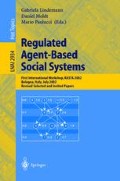Abstract
An artificial society of learning software agents employing preferential partner selection and the Iterated Prisoner’s Dilemma as a means of social interaction is described. The IPD has been used extensively in modeling interaction and the development of cooperation in communities, but existing research has focused predominantly on identifying successful strategies in tournaments and ecological simulation. This simulation models an alternative scenario, one in which the members of the community are fixed, but are endowed with a personality and the ability to develop preferences among the other members of the community. It was predicted that such agents would learn to associate with agents which they judge to be favorable, and that the community would achieve a higher net efficiency than it would if interactions occurred randomly. Communities of highly selective agents were found to perform consistently better than non-selective ones.
Access this chapter
Tax calculation will be finalised at checkout
Purchases are for personal use only
Preview
Unable to display preview. Download preview PDF.
References
Hardin, G.: The Tragedy of the Commons. Science 162, 1243–1248 (1968)
Felkins, L.: The Voter’s Paradox (1995), http://www.magnolia.net/~leonf/sd/vp-brf.html
Axelrod, R.: The Evolution of Cooperation. BasicBooks, New York (1984)
Beaufils, B., Delahaye, J., Mathieu, P.: Complete Classes of Strategies for the Classical Iterated Prisoner’s Dilemma (1998), http://www.lifl.fr/IPD/references/from_lifl/ep98/html
Campbell, R.: Background for the Uninitiated. In: Campbell, R., Sowden, L. (eds.) Paradoxes of Rationality and Cooperation, U. of British Columbia Press, Vancouver (1985)
Ashlock, D., et al.: Preferential Partner Selection in an Evolutionary Study of Prisoner’s Dilemma. BioSystems 37(1,2), 99–125 (1996)
Axelrod, R.: The Complexity of Cooperation. Princeton Univ. Press, Princeton (1997)
Eriksson, A., Lindgren, K.: Evolution of strategies in repeated stochastic games with full information of the payoff matrix. In: Spector, Lee, et al. (eds.) Proceedings of the Genetic and Evolutionary Computation Conference - GECCO-2001, Morgan Kaufmann Publishers, San Francisco (2001)
Software Agents: An Overview. BT ISR Agent Research, http://193.113.209.147/projects/agents/publish/papers/review2.htm
Sandholm, T.W., Crites, R.H.: Multiagent reinforcement learning in the iterated prisoner’s dilemma. BioSystems 37(1,2), 147–166 (1996)
Skyrms, B., Pemantle, R.: A Dynamic Model of Social Network Formation. Proceedings of the National Academy of Sciences of the USA 97, 9340–9934 (2000)
Macy, M.W., Flache, A.: Learning Dynamics in Social Dilemmas. Proceedings of the National Academy of Sciences USA 99, 7229–7236 (2002)
Author information
Authors and Affiliations
Editor information
Editors and Affiliations
Rights and permissions
Copyright information
© 2004 Springer-Verlag Berlin Heidelberg
About this paper
Cite this paper
Vanninen, M.A., Rose, J.R. (2004). Social Organization in a Software Agent Community with a Non-zero-Sum Game Interaction Model. In: Lindemann, G., Moldt, D., Paolucci, M. (eds) Regulated Agent-Based Social Systems. RASTA 2002. Lecture Notes in Computer Science(), vol 2934. Springer, Berlin, Heidelberg. https://doi.org/10.1007/978-3-540-25867-4_11
Download citation
DOI: https://doi.org/10.1007/978-3-540-25867-4_11
Publisher Name: Springer, Berlin, Heidelberg
Print ISBN: 978-3-540-20923-2
Online ISBN: 978-3-540-25867-4
eBook Packages: Springer Book Archive

